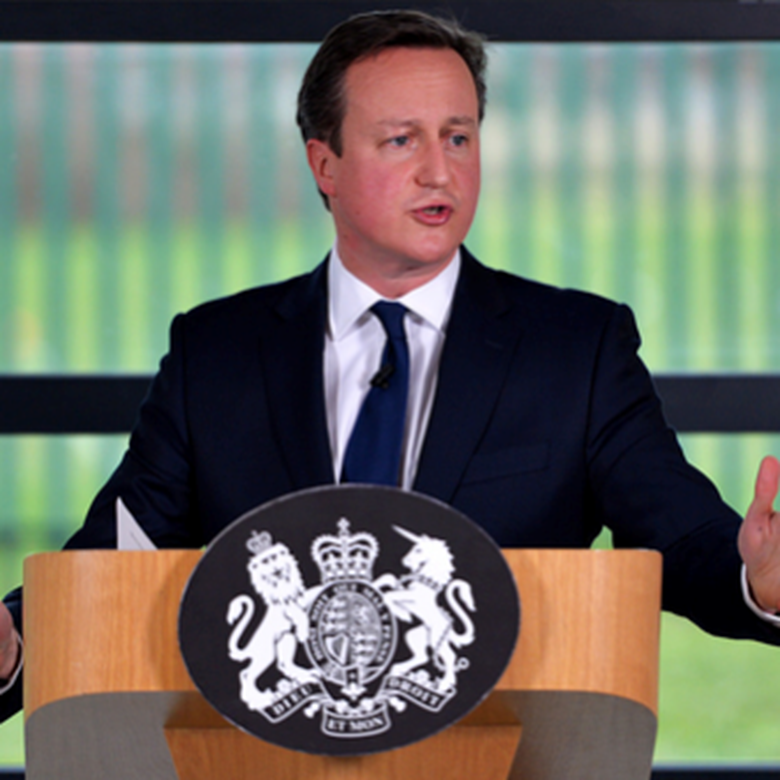Cameron reaffirms plans to legislate to boost adoptions
Neil Puffett
Monday, May 16, 2016
The government is to pursue changes to the law so that more children are placed with adoptive parents rather than relatives, Prime Minister David Cameron has confirmed.

Writing in The Sunday Times ahead of government’s legislative programme for the coming year being outlined in the Queen’s Speech on Wednesday, Cameron said adoption results in “more permanent solutions and better outcomes” for vulnerable children than other forms of care.
He said changes to the law will “tip the balance in favour of permanent adoption where that is the right thing for the child — even when that means overriding family ties”.
“Foster parents do an amazing job for many, but I am unashamedly pro-adoption because I believe all children need a loving, permanent and stable home,” he said.
“But recently the courts and social workers have begun to favour less stable placements with distant relatives, such as great-aunts and uncles, rather than adoption by new families that would produce more permanent solutions and better outcomes.
“Adoption numbers have now almost halved in the past two years. I am not neutral about this; for me, a child’s happiness and future life chances will always come above everything else.”
Plans to legislate to increase numbers of adoptions were first announced in January in response to the number of adoptions, and the number of children being placed for adoption, both falling.
The drop in children being placed for adoption and the subsequent drop in the number of adoptions taking place are widely accepted to stem from a ruling made in September 2013 by Sir James Munby in the case Re B-S.
In the ruling, Munby criticised "sloppy practice" of social workers and said that local authorities must provide evidence that all alternatives to adoption had been considered before bringing a case to court.
There has been a corresponding increase in the number of children being placed with special guardians. In March, it emerged that the number of special guardianship orders being made by the courts passed 5,000 in a single year for the first time.
The DfE is trying to take action to toughen up the process for granting SGOs, after finding that a “significant minority” of children are being placed at risk through inappropriate SGOs.
However, the plans to boost numbers of adoptions have prompted some concerns within the sector.
The British Association of Social Workers said the organisation is concerned about the Prime Minister’s "unequivocal statement of faith in adoption".
“This is a complex area in terms good practice, getting it right for children and making the best ethical decisions," a spokeswoman said.
“If the law is to be changed to give more priority to adoption as a preferred permanency solution, we foresee many legal, ethical and good practice problems arising that may not improve outcomes for children.
“The majority of children and families facing adoption are relatively poor and we believe that the government should be looking to prevent the number of children coming into care and going into adoption proceedings in the first place. This would mean better preventive support and also engaging with and learning from families who have experienced the care system.”
Jackie Sanders, director of public affairs at The Fostering Network, said: 'We are delighted that the Prime Minister has recognised the amazing job that foster carers do.
"However, on the eve of Foster Care Fortnight, we are again disappointed that this government’s rhetoric refuses to acknowledge the fact that for the vast majority of children in care foster families provide loving, stable and secure homes where children flourish.
"Adoption may be the best route to permanence for some children and we have no doubts that post-adoption support should be improved. However, it will always be a small minority of children in the care system who require adoption, with the vast majority living with foster families for as long as they need to."
Cameron also said the Queen’s Speech will contain legislation to reform the social work profession by introducing a new accreditation system and a new regulator to oversee it.
“Social workers are unsung heroes. Every day, they can change lives for the better,” he said.
“But prospective social workers are spending too much time in the classroom studying thousands of pages of guidance, and not enough time in real-life, on-the-job training.
“Instead of rigid rules and processes, we need them to use their experience and common sense to make good judgments, and to have the confidence to take decisions much earlier, rather than allowing so many to teeter permanently on the edge of the care system.
“So we will set new, demanding standards that we will expect every single child and family social worker to meet by 2020. And a new regulator will be brought in to oversee this new system.”




